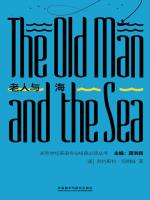Challenge Fate
The Old Man and the Sea is a novel written by the famous writer Ernest Hemingway. It won the Pulitzer Prize and was one of the works that won Hemingway the Nobel Prize for Literature. As the last work published by Hemingway before his death, it is tragic and stirring but gives people strong spiritual power.
First of all, let's talk about the main storyline of the book. Our protagonist, Santiago , is an aging, experienced fisherman who has gone eighty-four days without catching a fish. H e is now seen as " salao ", the worst form of unlucky. On the eighty-fifth day of his unlucky streak, Santiago takes his skiff out early. By noon, he has hooked a big fish that he is sure is a marlin , but he is unable to haul it in. He is unwilling to tie the line to the boat for fear that a sudden jerk from the fish would break the line. With his back, shoulders, and hands, he holds the line for two days and nights. On the third day, the fatigued marlin begins to circle the skiff. Santiago, almost delirious, draws the line inward, bringing the marlin towards the boat. He pulls the marlin onto its side and stabs it with a harpoon, killing it. Seeing that the fish is too large to fit in the skiff, Santiago lashes it to the side of his boat. He sets sail for home, thinking of the high price the fish will bring him at the market and how many people he will feed. But the marlin's blood invites other fish to eat it. Santiago tried to fight them off, but to no avail. The marlin he caught was eaten up. Santiago reaches shore before dawn the next day. He struggles to his shack, leaving the fish head and skeleton with his skiff. Once home, he falls into a deep sleep.
The whole story leaves a sense of emptiness. Santiago had worked so hard to catch the marlin, but the result was still in vain. But as the famous words in this book say: a man can be destroyed, but not defeated. The main theme of the story is heroism. Santiago makes up for his age with his endurance to withstand hunger, pain and isolation. He does not blame the sharks for snatching the marlin, but he acknowledges that it is his mistake to have ventured far inward into the sea. As a fisher who has caught no fish in 84 days, Santiago is fighting against defeat. However, he does not yield because he moves further into the sea than he has ever sailed before. He struggles with the marlin despite his exhaustion and pain. After catching it, he hopelessly fights off the sharks. Whenever the situation gets difficult and he is threatened with despair, he uses various tactics to stimulate his opposition to defeat: He recollects memories of his strength while he was young through dreams, and sometimes prays to God. Santiago has unlimited potentialities in the presence of danger. His potential is realized when he manages to get the giant marlin. However, the outcome is less significant than the struggle as he also chooses to battle with the sharks. As a result, it is not really important that he brings the marlin home; the important thing is he wins the battle, and after the struggle he becomes a hero.
The story’s black hole is “a man can be destroyed but not defeated”. Santiago symbolizes every man’s battle to survive. Just like Santiago’s attempt to take the marlin to the mainland intact is unsuccessful, no man can escape death. However, through Santiago’s struggle, the author illustrates that escaping from death is not the major concern. Santiago sees the words, “a man can be destroyed but not defeated” close to the end of his tussle with the marlin. That is to say, victory over the unavoidable does not define a man. Rather, it is his struggle against the inevitable that defines him.
In this book, there are many sentences describing Santiago's psychological activities, all of which reflect his firm determination and strong psychology that can never be defeated. He could be called a hero, even if he was scarred, even if he didn't succeed in catching a fish that brought him money.
Most of us live a much better life than Santiago . But all too often we become frustrated by setbacks and lose even hope of continuing to fight our destiny. But when we see the example of , how can we not fire up the passion to fight against fate? There will be no lack of failure in our life, but failure doesn't mean we have to stay defeated. If we can bounce back from failure over and over again, we can get the psychological feeling of winning. Sometimes such optimism is a necessity in life. I hope everyone who reads this book will ignite the courage to fight against fate and gain the spiritual strength of Santiago.




 京公网安备 11010802032529号
京公网安备 11010802032529号